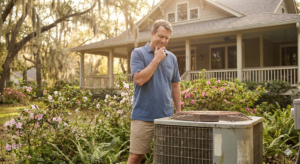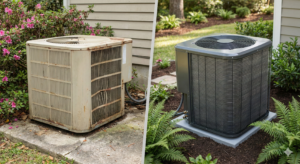Summers in Charleston feel heavy in more ways than one. The heat is tough, sure, but the humidity makes it even more uncomfortable. That sticky feeling you get when you walk inside your house? It could be a sign your HVAC system is working overtime, or worse, not working the way it should.
Humidity doesn’t just make your air feel thick. It affects how well your HVAC system cools your home. When the moisture level in the air skyrockets, it puts extra stress on your system. Knowing how humidity interacts with your HVAC setup helps you stay comfortable without pushing your air conditioner to the brink. Let’s break down what’s really going on inside your home and how you can keep things running smoothly.
The Impact of High Humidity on HVAC Systems
High humidity changes how your HVAC system works, and not in a good way. When there’s more moisture in the air, it forces your AC unit to work harder to both cool and dehumidify. That kind of workload can wear it out faster than normal.
When your system struggles to keep up, you’ll notice some clear signs:
1. The air feels cool but clammy
2. Your home takes a long time to feel comfortable
3. Your energy bills are climbing even though you haven’t changed the temperature
Beyond the immediate discomfort, all that extra moisture puts stress on internal HVAC parts. Coils can start to corrode. Electrical connections may act up. And worst of all, moisture sitting inside vents and ducts creates a perfect place for mold to grow. Mold doesn’t just hurt air quality. It can also spread into walls and insulation, creating more serious and costly damage.
A good example is when a Charleston homeowner noticed the thermostat read 72 degrees, but the house still felt stuffy and damp. Turns out the evaporator coil had collected too much condensation that wasn’t draining properly. That not only slowed the cooling down, it also caused a musty smell to spread through the vents.
If your AC can’t pull enough moisture from the air, it won’t matter what temperature you’ve set. It won’t cool your home effectively, and it certainly won’t do your energy bill any favors.
How to Maintain Your HVAC System During High Humidity
Keeping your HVAC system running smoothly in humid weather doesn’t have to be complicated. A few simple steps can make a big difference in how your system performs and how long it lasts.
1. Change air filters often
Charleston summers bring not just humidity, but also pollen and dust. Air filters clog up faster, especially if you have pets. When a filter gets dirty, airflow is restricted and your system has to push harder to get air through. That adds up to more strain and higher bills. Change filters every few weeks during peak season.
2. Clear the condensate drain
The condensate drain helps pull moisture away from your HVAC system. But when it clogs, that water can back up and cause leaks or system shutdowns. Check and clear this drain at the start of every season and especially after heavy use.
3. Set your thermostat correctly
During muggy weather, use the “auto” fan setting instead of “on.” When the fan’s always running, it can cycle moisture back into the air instead of removing it.
4. Schedule seasonal tune-ups
Preventative maintenance goes a long way. A qualified HVAC tech can spot early signs of trouble, clean internal parts like coils, and check that refrigerant levels and humidistat settings are on point. This can help you avoid bigger repairs later.
5. Seal up moisture entry points
Check areas where humid air can sneak in—attics, basements, crawlspaces, and around windows. Use weatherstripping or insulation to tighten things up. Keeping outside air out helps your HVAC keep indoor humidity under control.
Small actions like these not only protect your HVAC unit, but also help your home feel more comfortable no matter how sticky it gets outside.
Signs You Need HVAC Repair in Charleston Due to Humidity
Humidity wears away at your HVAC system slowly. That’s why it’s easy to overlook the early signs that something isn’t working the way it should. But catching these signs early can save you from pricey repairs later.
Here’s what Charleston homeowners should watch for:
1. Cooling that feels unsatisfying
If your AC is on but the room still feels muggy, your system may be falling short on removing moisture. That could point to issues with the evaporator coil or refrigerant levels.
2. Strange noises
Clicking, buzzing, hissing, or gurgling can mean condensation is building up in places it shouldn’t be. It may also signal mold starting to grow inside.
3. Leaks or water spots
If there’s water pooling under your HVAC unit or staining your ceiling, your condensate drain could be blocked. Excess humidity mixed with a clogged drain is never a good combo.
4. Bad smells
A musty odor that lingers when your AC is running could mean mold or mildew is taking hold inside the system. That’s not something you want floating through your vents.
Ignoring these warnings could lead to damaged parts, poor air quality, or even total system breakdown. If something feels off, it’s smart to get it checked out before it turns into a bigger problem.
Choosing Professional Help for HVAC Issues
When humidity-related problems pop up, it might be tempting to investigate things yourself. But professional help makes a big difference when it comes to HVAC repair.
Here’s why bringing in a qualified technician is a smart move:
1. Experience and training
Licensed HVAC professionals know how to spot problems that most homeowners miss. They’re trained to handle everything from blocked drainage lines to mold in ductwork.
2. Proper tools and parts
A pro arrives with the equipment and replacement parts needed to fix things the right way. They’ll get the job done without causing more damage.
3. Safety
HVAC units involve electricity, refrigerant, and moisture. That’s a risky mix if not handled carefully. Hiring someone who knows the right procedures keeps your home and family safe.
4. Local know-how
Charleston’s humid climate throws unique challenges at every AC system. Local experts like ours are familiar with what works well in this environment—and what doesn’t.
Repairs and tune-ups are too important to put off or approach the wrong way. Calling in a pro gives you peace of mind and a faster return to comfort.
Keep Humidity from Taking Over Your Home
Staying cool during Charleston’s humid months means more than just setting the thermostat and hoping for the best. High humidity levels strain your HVAC system, affect your comfort, and could even lead to long-term damage. By catching the early signs of humidity issues, staying consistent with maintenance, and calling in expert help when things go wrong, you protect both your comfort and your HVAC investment.
The heat and moisture outside don’t need to follow you indoors. With the right attention and professional support, your home can feel cool, dry, and inviting no matter what the weather brings.
If you’re noticing your HVAC system struggling to keep up with Charleston’s humid weather, it’s time to address the issue before it becomes a bigger problem. For reliable service and long-term comfort, explore our HVAC repair in Charleston to get your system back on track. At Coastal Carolina Comfort, we’re here to help you enjoy a comfortable home all year long.


